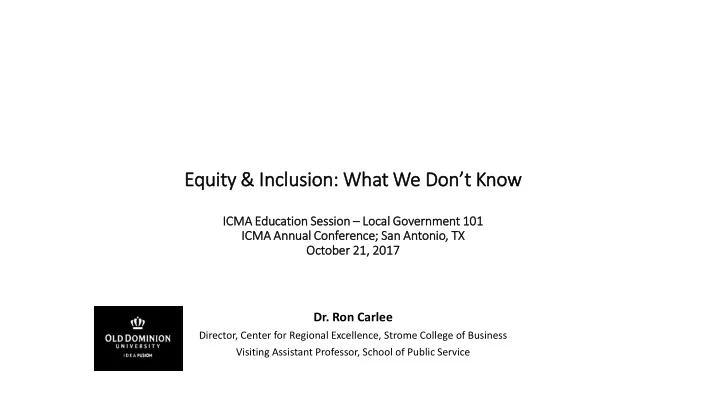

Equity & Inclusion: What We Don’t Know ICM ICMA Educatio ion Sess Sessio ion – Loc Local Go Government 101 101 ICM ICMA Ann nnual l Co Conference; San San Antonio io, TX Oc October 21, 21, 2017 2017 Dr. Ron Carlee Director, Center for Regional Excellence, Strome College of Business Visiting Assistant Professor, School of Public Service
Agenda • Awareness • Sharing • Peer Learning …on race and identity 2
Leadership • Is not a game of solitaire • Is about others…working together for a common purpose • Organizational psychology identifies three critical element of leadership: • Traits: who we are • Skills: what we know • Behaviors: what we do • Leaders adjust their behaviors to meet the diverse needs of their team members • To adjust to others, we must first know ourselves 3
Ground Rules • Do not expect perfection, but assume goodwill (Multi-Cultural Team Arlington Human Services). • Seek first to understand and then to be understood (Stephen Covey). • When someone says something that you do not understand, listen harder (Kettering Foundation). • Rather than using “Yes, but …” statements, try using “Yes, and …” statements (ImprovEdge). • If something feels hurtful, explain the source or nature of the hurt; create a learnable moment. 4
The Race Card Project “Despite all the talk about America’s consternation or cowardice when it comes to talking about race , I seemed to have found Michele Norris auditorium after auditorium full of people who were more than willing to unburden themselves on this prickly topic.” 5
Write Your Race Card Think about your… Take those thoughts experiences , and distill them to questions , hopes , just one sentence dreams , that has only six laments or words. observations about race and identity. 6
7
Project Implicit • Project Implicit is a non-profit organization and international collaboration between researchers who are interested in implicit social cognition - thoughts and feelings outside of conscious awareness and control. • Project Implicit was founded in 1998 by three scientists – Tony Greenwald (University of Washington), Mahzarin Banaji (Harvard University), and Brian Nosek (University of Virginia). • https://www.projectimplicit.net. 8
We don’t know… • People don’t always say what’s on their minds. One reason is that they are unwilling. • The difference between being unwilling and unable is the difference between purposely hiding something from someone and unknowingly hiding something from yourself. • The Implicit Association Test (IAT) measures attitudes and beliefs that people may be unwilling or unable to report. Project Implicit 9
What are implicit and explicit stereotypes? • Stereotypes are the belief that most members of a group have some characteristic. • Explicit stereotype: you deliberately think about and report. • Implicit stereotype: relatively inaccessible to conscious awareness and/or control. Project Implicit 10
What we say and what we think… • Even if you say that men and women are equally good at math, it is possible that you associate math more strongly with men without being actively aware of it. In this case we would say that you have an implicit math + men stereotype. (Project Implicit) • What are some other common stereotypes that people have about characteristics with which you identify? 11
Implicit Bias • Take the test… https://implicit.harvard.edu/implicit/takeatest.html 12
What did you learn? https://www.theodysseyonline.com/profiling-stereotyping 13
Resources for Understanding Racism RACE – The Power of an Illusion, PBS http://www.pbs.org/race/000_General/000_00-Home.htm The Racial Equity Institute https://www.racialequityinstitute.org/ Kirwan Institute - Study of Race & Ethnicity http://kirwaninstitute.osu.edu/ Crossroads Antiracism Organizing & Training http://crossroadsantiracism.org/ Government Alliance on Race and Equity GARE http://www.racialequityalliance.org/ 14
Resources for Community Dialogue Kettering Foundation Naming and Framing Difficult Issues to Make Sound Decisions https://www.kettering.org/ National Civic League All-America Conversations Toolkit http://www.nationalcivicleague.org/ National Issues Forum Safety & Justice Guide https://www.nifi.org/en Ohio State Divided Community Project Key Considerations for Community Leaders Facing Civil Unrest: Effective Problem-Solving Strategies That Have Been Used in Other Communities http://moritzlaw.osu.edu/dividedcommunityproject/key-considerations/ 15
Dr. Ron Carlee Director, Center for Regional Excellence, Strome College of Business Visiting Assistant Professor, School of Public Service rcarlee@odu.edu Twitter @roncarlee Mobile/Text 703-819-7311 16
Recommend
More recommend